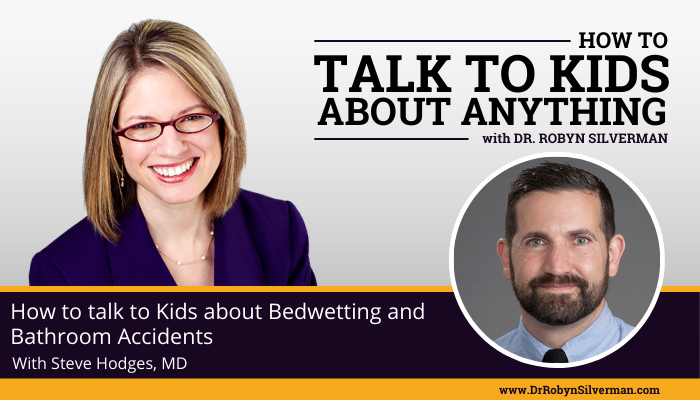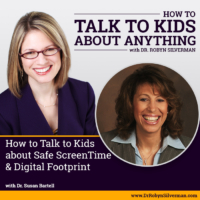Podcast: Play in new window | Download
Subscribe: Apple Podcasts | RSS | More
How to Talk to Kids about Bed-wetting and Day-time Accidents
Anyone who has a child who has dealt with bedwetting, constipation, or bathroom-related accidents knows that these issues can have a toll on their child’s self-esteem. Parents also have heard that their kids have to wait to just “grow out of it.” But according to Dr. Steve Hodges, Professor of Pediatric Urology at Wake Forest University School of Medicine and a leading authority on childhood toileting issues, that just is not often the case. Here’s how to talk to kids about bedwetting and bathroom-related accidents.
INTRODUCTION:
Anyone who has a child who has dealt with bedwetting, constipation, or bathroom-related accidents has probably been told what most parents have heard—their kid will grow out of it! Just wait, and in their own time, the child will stop wetting the bed—their bodies will become more regular, they will stop having accidents just as soon as their bodies mature—but what if I told you, according to my next very knowledgeable guest, that this is not often the case. That the idea that your child will simply grow out of bedwetting, poop accidents, or daytime wetting is a myth. The good news is, that there is something we can do to help our kids. Let’s turn our attention to Dr. Steve Hodges.
Bio:
Dr. Steve Hodges, a Professor of Pediatric Urology at Wake Forest University School of Medicine, is a leading authority on childhood toileting issues. He is dedicated to debunking common myths surrounding enuresis (bedtime and daytime wetting) and encopresis (poop accidents), emphasizing that these issues are never a child’s fault. Dr. Hodges, residing in Winston-Salem, North Carolina, with his family, has authored eight books for both parents and children, such as “The M.O.P. Anthology” and “Bedwetting and Accidents Aren’t Your Fault.” He shares valuable insights through his blog at BedwettingAndAccidents.com.
Important Messages:
- Finding that traditional methods weren’t really working for the kids coming into my office who were having nighttime accidents & daytime accidents. It got very discouraging. these kids not being, getting better frustrated me and I tried to find a better way.
- Myths:
- Myth 1: Children are having accidents on purpose. In fact, they don’t even know it’s happening and are as surprised as we are! Please don’t get frustrated with them. This is a common reason for child abuse.
- Myth 2: Bedwetting is a learned process, as in, you potty train during the day, then you potty train them at night. Night training is not a thing. You’re dry at night naturally if you’re functioning normally as a child. And so, you don’t have to night train anyone.
- Myth 3: Controversial one– most people focus on the urine, urine output and the sleep as the main cause of bedwetting because when you wet the bed, you, the bed is so wet it seems as like way too much pee. And when parents try to wake up these kids at night, they’re very difficult to arouse. More to do with constipation.
- As children are getting older, they’re entering school, let’s say they’re not with us all day. They’re, you know, they’re in elementary school or middle, even middle school. How do we actually know if our kids are constipated?
- SIGNS: (1) If you have kids with pee accidents day or night poop accidents, then that’s proof positive that they’re backed up with poop unless you prove otherwise. (2) And then some kids just have belly pain, you know, most common belly pain reason in a visit to the emergency room is, is constipation. (3) The size of the poop. You know, if, if they’re pooping jumbo size, huge poops. They had to get kind of packed in there and then kind of forced out. So that’s a sign that they’re delaying defecation and then therefore could putting out a big one. (4) Itchy (5) “Skidmarks”
- Talking about it (Dr. Hodges):
- It’s very difficult for kids to initiate elimination without the urges. And so when they’ve gotten to the point where they’re backed up, maybe their sensations are outta whack. So it’s hard for them to go at the right time or maybe they have accidents. So I think early on, I you want to address this– these are kids you’re not talking to infants, the newborns.
- Focusing on the importance of elimination. We have a couple videos that show things getting backed up and clogged and how you, it’s gotta go somewhere, right? I think kids think when they hold it in and the urge goes away that the problem’s gone.
- If they know what a mammal is, but you know you that the average def time or poop time from mammal is 12 seconds. So I don’t know where I got that from, but I remember that. And I thinks about, if you think about it, if you’re having normal bowel habits and you sit down, you poop, you get up, you go.
- I turn the kid at the end saying, your only job, this entire process is to poop when you feel it. And don’t wait. Almost make a game of it and see if you can get there how fast you can get there for after, after you feel the urge, I bet you you’re gonna get better. And so some of that works.
- Stretched out colon: So it’s kind of a two part process to restoring normal function is to empty out the backed up poop. And then two is to keep it empty so that the colon has a chance to recover.
- Talking to kids (Dr. Robyn):
- When your kid is small, infants and toddlers, that is a great time to introduce concepts, words that you may feel uneasy saying because your child isn’t only going off of how you’re reacting.
- Make sure that you are talking to your kids about the different body parts.
- You can talk about having a normal bowel movement.
- You can say constipation, you can say these words when the child is an infant at the time. They’re not getting back to you on it. It just gives you a little bit of practice anytime that you’re feeling worried about that. But as they’re getting older and you’ve already practiced saying these words, penis and anus, etc, it’s going to really help them to be able to identify when there’s a problem.
- We might not know about these issues as far as like them feeling itchy or uncomfortable unless they’re willing to say it to us and they will be more willing to say it to us. If we’ve been more willing to identify body parts and introduce this conversation early on.
- Lack of conversation happening. When I’m in a clinic visit and I ask a child, you know, or the parent, how often are you pooping, they kind of just look at each other and, and that points to the fact that it’s not talked about. I think talking about early and often is very important. Parents are very concerned about what the child eats, physical exercise or activity, but elimination is kind of kept under the rug. And so potty training’s not the end of your job as a parent. It’s the beginning. And so once you want to maintain good health elimination habits to potty training and then kind of maintain it by observing that. And I think it’s very important.
- Talking to your child about bathroom habits: As you are saying, potty training isn’t over when our child pees and poops in the toilet. That we can have a conversation going onward from that to say, okay, you’ve now been able to do this during the day and you’re dry during the day and in order to be dry overnight, we have to make sure your body is working well. This has nothing to do with you and your behavior or what’s going on in your mind or when you’re sleeping. It has to do with making sure that you’re healthy from the top to the bottom and here’s how we can do that. So you’re just continuing the conversation onward. And because you’ve already been talking about potty training all this time, what a beautiful continuation to the conversation. Of course, many times we are not in that situation.
- Diet: people will try to improve their diet, which is great, add fiber, but typically you need more potent therapies when a child is constipated over time. But then they also have to learn that it doesn’t hurt if you go on time.
- Laxatives, Miralax, etc can make poop more mush y and easier to go and that can help in the beginning. Good feedback to know, they went to the bathroom, it didn’t hurt, so they’ll go to the bathroom. Hard poop is very uncomfortable to pass.
- Talking about poop and modeling discussion: I would also suggest to anybody who’s listening that if you can feel more comfortable talking about your process of talking about poop and “Oh, I just had a big bowel movement, I feel so much better. I love when I make sure that I go and first thing in the morning or whenever it was so that I feel ready for the day” or on the, you know, vice versa. Or, “I don’t feel good. I haven’t gone to the bathroom today. I don’t know what’s going on. And I’m going to need to do this in order to go because I definitely don’t want to get backed up.” When we model that and we are comfortable with it, it’s going to help our kids so much more. You don’t have to be talking about this in the middle of the grocery store. You’re talking about it in the privacy of your home, although you can talk about the grocery store, whatever, but like you can talk about this at home with your child and that further takes away the stigma.
- Enemas can be the most effective and easiest ways to get the poop out—parents need to watch how they speak about them so that the kids don’t learn to have a negative opinion of them simply by listening to the parent.
- Models, drawings, famous video “the poo and you” https://www.youtube.com/watch?v=SgBj7Mc_4sc
- Pullups? Take them away? Pullups have no bearing on whether or not the wedding happens. So whatever it takes to make your job easier to keep the bed dry because no one wants to change sheets every day.
- Typically, as a child gets more backed up with poop, bedwetting is the first thing that shows up. So that will be almost always there. There’s so many kids are backed up a little bit as they get backed up more. They might have some daytime symptoms like frequency or urgency, maybe some day accidents, but they’re rare. And then as they get even more backed up, they may have poop accidents which is kind of end stage– poop is falling out. There are some kids that don’t have the bladder component of this at all. That’s just the way they’re made and they just show up with the late stage poop accents. My point mentioning that is a lot of people come into my office and say “my child’s wetting the bed. How can I stop it?”
- GOAL: The whole goal of the protocol is just to empty the rectum daily and keep it empty. And we use oral laxatives, stimulant laxatives, enemas, suppositories to get them empty. And then once they’re dry, we slowly taper off that so that we transition them back to kind of pooping on their own. Some kids regress, some kids don’t. If they have this positive potty behavior ingrained, you can get them empty. But if they haven’t learned to poop or pee on time, then their problems may recur.
- The most important thing for parents to remember when parenting kids with bedwetting constipation or other bathroom related accidents is, first, it’s not their fault and second, we get caught up in this ‘constipated kids having accidents and 90% of them are caused by poop. But there’s a small subset that have a real medical problem. That’s another reason why I say you shouldn’t ignore this stuff.
- Who has more accidents? I think boys and girls are pretty equal girls, girls much more likely to have UTI obviously because they have a, their anatomy is such that they’re more prone to UTIs. There’s 10 times higher incidence of ADHD in kids with incontinence or dysfunctional elimination. But that’s all another conversation on chicken and the egg. Like, because, all the data’s coming out now that bed wetters don’t sleep well. And so could that affect how their brain functions? I think it does. And then on the spectrum disorder, autistic kids, we have very high rate of constipation and accents as well and difficulty with potty training. So yeah, I think those kids really need special focus.
- And so those people who are listening, who have kids who are neurodiverse, you are not alone. As you can hear many kids are dealing with this right now. Many parents are on the same boat and there are solutions and they do need help and deserve help. So you deserve help. So please find somebody like Dr. Steve Hodges because there’s information out there and you can start with his books.
- Don’t explain away accidents, even after, potty training. If you have a child that’s potty trained out of diapers and, and having poop accents, just get them evaluated because we can make a difference. You don’t want to be 10 years down the road, because every time they visit the doctor they’re told, ‘they’ll outgrow it.’ They outgrow it a decade later? How many loads of laundry later we, finally treat it. Don’t ignore these issues. We can fix them, we can make them better.
Notable Quotables:
- Children are not having accidents on purpose. They are as surprised as you are! It’s important to prevent parents from getting frustrated with their kids for having bathroom accidents because this is a common cause of child abuse.
- If you have kids with pee accidents day or night poop accidents, then that’s proof positive that they’re backed up with poop unless you prove otherwise. And then some kids just have belly pain—the most common reason for a belly pain visit to the emergency room is constipation.
- I think talking about bathroom habits early and often is very important. Parents are very concerned about what the child eats, physical exercise or activity, but elimination is kind of kept under the rug. Potty training’s not the end of your job as a parent. It’s the beginning.
- Don’t explain away accidents, even after, potty training. If you have a child that’s potty trained out of diapers and, and having poop accents, just get them evaluated because we can make a difference. You don’t want to be 10 years down the road, because every time they visit the doctor they’re told, ‘they’ll outgrow it.’ They outgrow it a decade later? How many loads of laundry later we, finally treat it. Don’t ignore these issues. We can fix them, we can make them better.
- The quality of life measurements are off the charts in terms of how bathroom accidents affects quality of life. So another reason to take care of this issue is just to make your kids happier and healthier kids.









